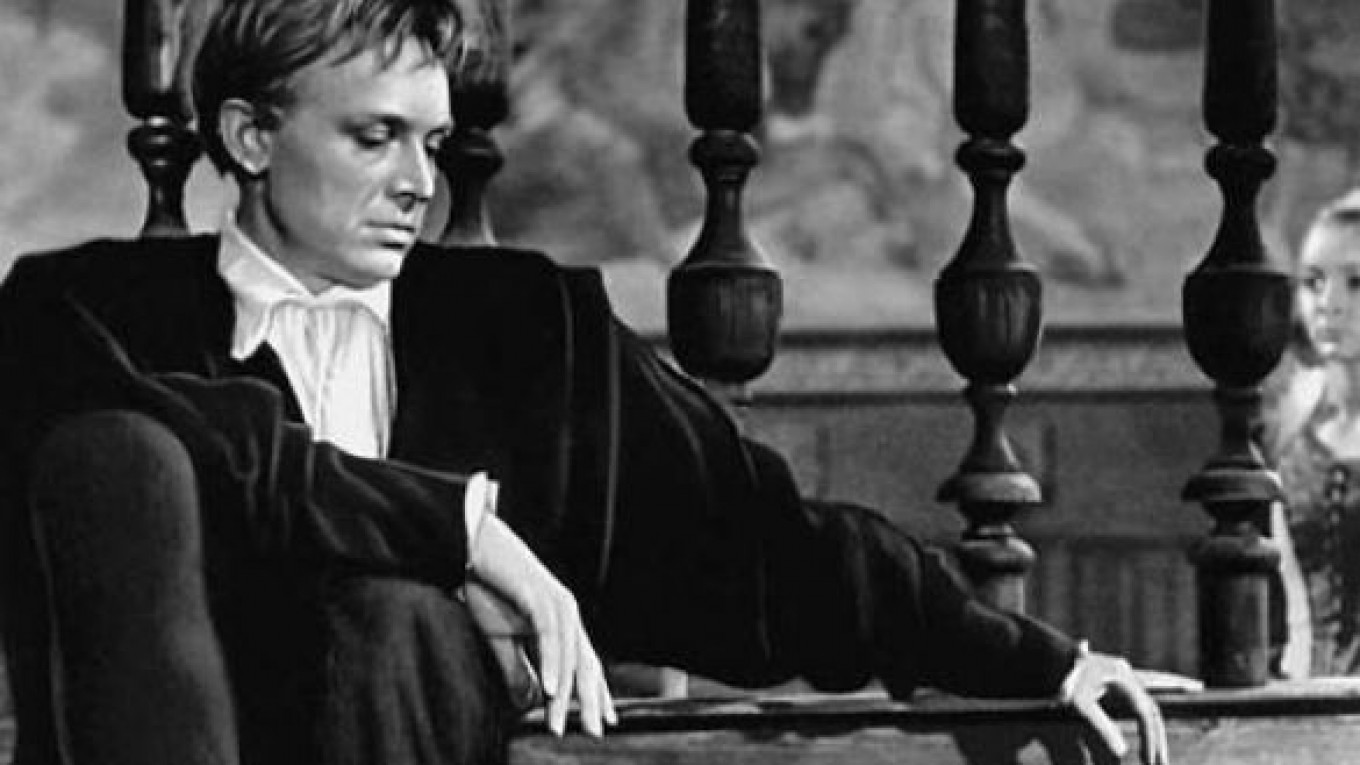As I have already had reason to say in this space, this season marks the 20th anniversary since I began reporting on theater for The Moscow Times and its precursor, The Moscow Guardian. That event has twice sent me to my back pages to recall bits and pieces of ancient history — my memories of my first review for The Moscow Guardian and some thoughts on the nature of Moscow theater in the early 1990s prompted by an early Moscow Times review of a show called "The Gamblers — 21st Century."
Today I again return to the early 1990s and an encounter with two of Russia's greatest actors of the second half of the 20th century — Innokenty Smoktunovsky and Oleg Yefremov. This, I hasten to add, was a purely professional encounter. The year was 1992, and I was seated comfortably among spectators at the Moscow Art Theater while Smoktunovsky and Yefremov performed in Vyacheslav Dolgachyov's production of "The Possible Meeting," a comedy composed by German writer and journalist Paul Barz about an imaginary meeting between the great composers and rivals Handel and Bach.
If theater can be champagne, this show was 10 cases of it. I still stand by the gushing final paragraph of my review: "There's no need underestimating what is at stake in this exhilarating performance. Like the characters they play, the two great actors are locked in a sparring match. It is a battle from which everyone emerges a winner. It takes a genius to play one and this performance gives us two at once! Bravo!"
Yes, indeed!
As I trace my memory in search of similar theatrical one-two punches I have experienced, I only come up with Jessica Tandy and Hume Cronyn in "The Gin Game," a touring production of which I saw in Leningrad in 1979. Never have I seen petty bickering and trivial skullduggery performed with such gusto and consequence as it was by these two acting duos.
Smoktunovsky, who died in 1994, less than two years after the premiere of "The Possible Meeting," was famous for his love of self. He once memorably claimed that his director Grigory Kozintsev in the legendary Russian film version of "Hamlet" was a no-count amateur and that whatever success the film had was thanks to his — Smoktunovsky's — heroic performance of the title role.
One of my favorite memories is of seeing Smoktunovsky enter the stage door at the Moscow Art Theater one day. I happened to be walking by on Kamergersky Pereulok, the lane on which the theater stands, and I saw him approaching. So beautiful was his carriage and so compelling his presence, I stopped and watched him after he passed. Walking slowly, rather like a school child playing hooky, he stopped in front of every portrait he could find of himself on the Art Theater walls. He stood before each, contemplating his own likeness with love and affection. It was a beautiful scene, and I'll never forget it.
Smoktunovsky was an actor of boundless grace and elegance who possessed an innate understanding of understated gesture and speech. At his best his work was seamless. Everything about him was soft, rounded and polished. He moved like a cat, employing speed and lethargy in equal parts and always at the right moments.
It goes without saying that Smoktunovsky played Bach in "The Possible Meeting." There never was any doubt that the actor considered himself anything less than perfect for the role of one of the greatest geniuses the world has known. His performance was an exercise in supreme self-admiration and self-
adoration, and it fit to perfection. Smoktunovsky oozed genius while always leaving just enough room to have laughs at himself and the character he was performing.
Yefremov's Handel was cranky and cantankerous and no less aware of his prodigious talents than his opponent. But what perhaps was most striking of all was his extreme generosity on stage.
Yefremov and Smoktunovsky each had reason to consider himself the finest, maybe the most beloved, actor of his age. This naturally made them competitors. As actors at the Moscow Art Theater (where Yefremov was artistic director from 1970 until his death in 2000), they were colleagues. In "The Possible Meeting," they were both competitors and colleagues, and each performed knowing that well.
But it was Yefremov who repeatedly backed off to let Smoktunovsky shine. Playing a character who was as abrasive as sandpaper, Yefremov-the-actor never tried to play one-upmanship with his partner. As he groused and grumbled in character as Handel, you could see the actor underneath delighting in Smoktunovsky's soaring flights of acting prowess. For every jesting thrust Smoktunovsky sent his way, Yefremov parried easily. And then he would stand back as if to say, "My, my! Isn't that Smoktunovsky something! A bit over the top, perhaps, but, damn, he's good!"
I'll tell you what: They both were.
A Message from The Moscow Times:
Dear readers,
We are facing unprecedented challenges. Russia's Prosecutor General's Office has designated The Moscow Times as an "undesirable" organization, criminalizing our work and putting our staff at risk of prosecution. This follows our earlier unjust labeling as a "foreign agent."
These actions are direct attempts to silence independent journalism in Russia. The authorities claim our work "discredits the decisions of the Russian leadership." We see things differently: we strive to provide accurate, unbiased reporting on Russia.
We, the journalists of The Moscow Times, refuse to be silenced. But to continue our work, we need your help.
Your support, no matter how small, makes a world of difference. If you can, please support us monthly starting from just $2. It's quick to set up, and every contribution makes a significant impact.
By supporting The Moscow Times, you're defending open, independent journalism in the face of repression. Thank you for standing with us.
Remind me later.







